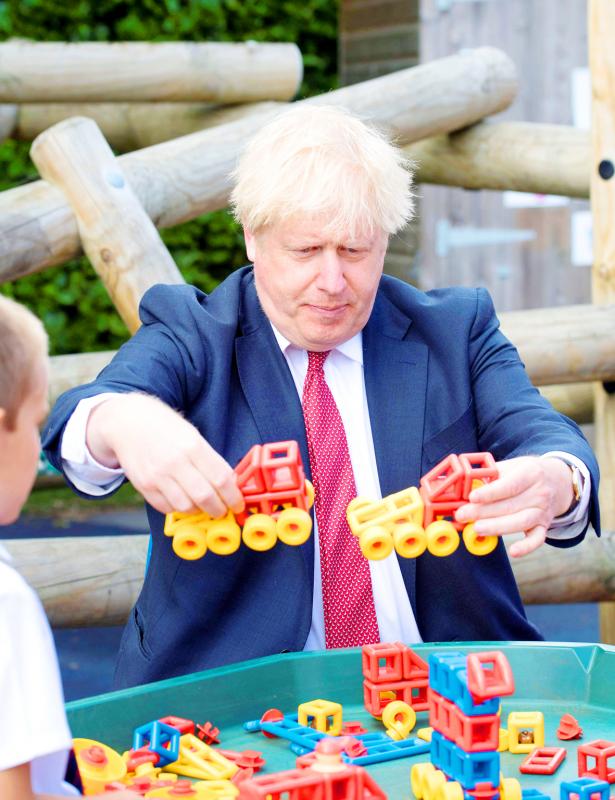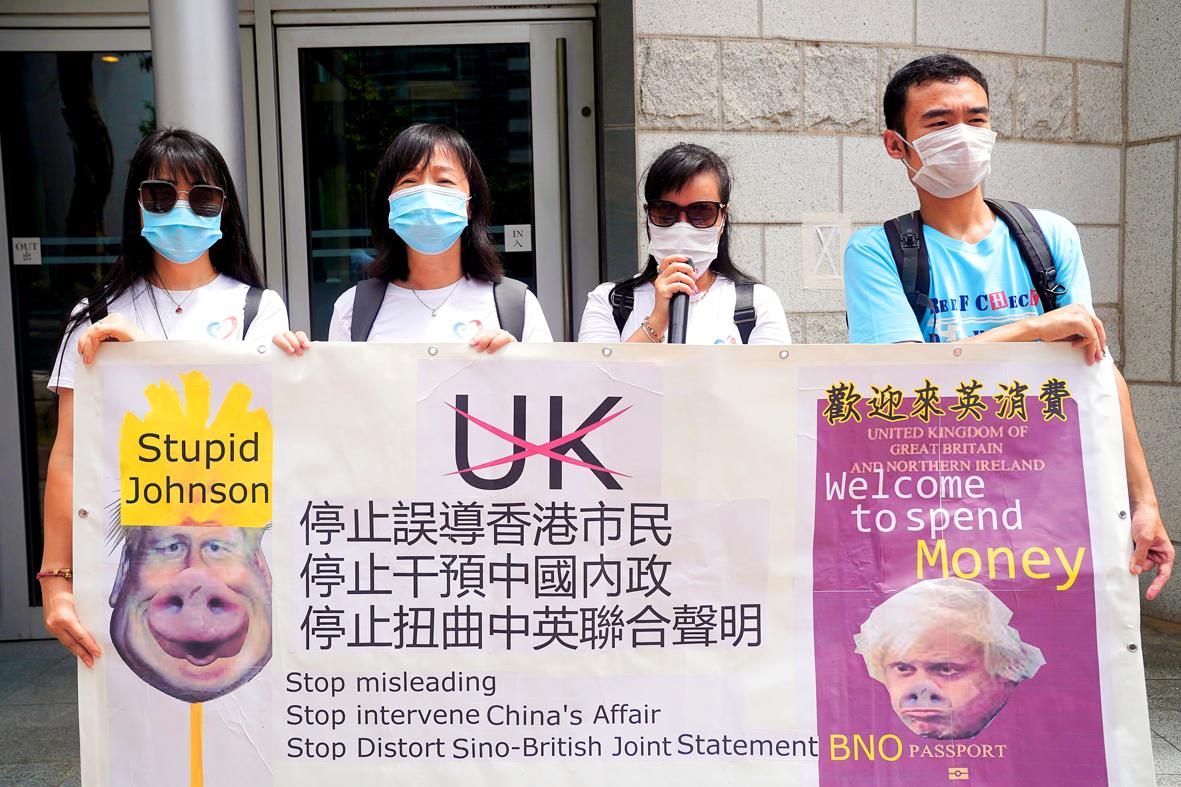British Prime Minister Boris Johnson yesterday all but confirmed that the UK would suspend an extradition treaty with Hong Kong owing to a National Security Law imposed by Beijing, bringing another clash with China following last week’s decision over Huawei Technologies Co (華為).
Speaking on a visit to a school in Kent, England, Johnson said that British Secretary of State for Foreign and Commonwealth Affairs Dominic Raab would explain later yesterday “about how we are going to change our extradition arrangements to reflect our concerns about what’s happening with the security law in Hong Kong.”
Raab was due to address the UK House of Commons yesterday afternoon and was widely expected to suspend extradition to Hong Kong in light of the law, which effectively criminalizes most political dissent and can even target actions outside of Hong Kong or mainland China.

Photo: AFP
The US, Canada and Australia have already taken similar actions over extradition to Hong Kong.
Earlier yesterday, Chinese Ministry of Foreign Affairs spokesman Wang Wenbin (汪文斌) said such a move by the UK, plus other mooted plans, such as actions against individual Chinese officials due to rights abuses, would harm relations between the two countries.
“These HK-related remarks turn a blind eye to the basic facts that the National Security Law is for the sustained success of ‘one China, two systems,’” Wang said, referring to the system by which Hong Kong has been governed since it returned to Chinese rule in 1997.

Photo: Reuters
“We strongly condemn these actions. We urge the UK to take no more steps down the wrong path, so as to avoid further damage to China-UK relations,” he said.
The UK government last week said it would strip the Chinese telecoms firm Huawei of any role in the UK’s 5G network from 2027 owing to security concerns, which also enraged Beijing.
Johnson, during the school visit, said he did not seek confrontation with China, but the UK had grave concerns about Hong Kong and widespread reports of mass repression and rights abuses targeting the Uighur population in China’s Xinjiang region.
These have included accounts of forced sterilization of Uighur women and the incarceration of huge numbers of people in what appear to be concentration camps.
“There is a balance here,” Johnson said. “I’m not going to be pushed into a position of becoming a knee-jerk Sinophobe on every issue, somebody who is automatically anti-China. But we do have serious concerns. We have concerns about the treatment of the Uighur minority obviously, about the human rights abuses.”
“China is a giant factor of geopolitics, it’s going to be a giant factor in our lives and in the lives of our children and grandchildren. You have got to have a calibrated response and we are going to be tough on some things, but also going to continue to engage,” he added.

RESILIENCE: Deepening bilateral cooperation would extend the peace sustained over the 45 years since the Taiwan Relations Act, Greene said Taiwan-US relations are built on deep economic ties and shared values, American Institute in Taiwan (AIT) Director Raymond Greene said yesterday, adding that strengthening supply chain security in critical industries, enhancing societal resilience through cooperation and deepening partnerships are key to ensuring peace and stability for Taiwan in the years ahead. Greene made the remarks at the National Security Youth Forum, organized by National Taiwan University’s National Security and Strategy Studies Institution in Taipei. In his address in Mandarin Chinese, Greene said the Taiwan-US relationship is built on deep economic ties and shared interests, and grows stronger through the enduring friendship between

GAINING STEAM: The scheme initially failed to gather much attention, with only 188 cards issued in its first year, but gained popularity amid the COVID-19 pandemic Applications for the Employment Gold Card have increased in the past few years, with the card having been issued to a total of 13,191 people from 101 countries since its introduction in 2018, the National Development Council (NDC) said yesterday. Those who have received the card have included celebrities, such as former NBA star Dwight Howard and Australian-South Korean cheerleader Dahye Lee, the NDC said. The four-in-one Employment Gold Card combines a work permit, resident visa, Alien Resident Certificate (ARC) and re-entry permit. It was first introduced in February 2018 through the Act Governing Recruitment and Employment of Foreign Professionals (外國專業人才延攬及雇用法),

The Ministry of Transportation and Communications yesterday said that it would redesign the written portion of the driver’s license exam to make it more rigorous. “We hope that the exam can assess drivers’ understanding of traffic rules, particularly those who take the driver’s license test for the first time. In the past, drivers only needed to cram a book of test questions to pass the written exam,” Minister of Transportation and Communications Chen Shih-kai (陳世凱) told a news conference at the Taoyuan Motor Vehicle Office. “In the future, they would not be able to pass the test unless they study traffic regulations

EUROPEAN TARGETS: The planned Munich center would support TSMC’s European customers to design high-performance, energy-efficient chips, an executive said Taiwan Semiconductor Manufacturing Co (TSMC, 台積電), the world’s largest contract chipmaker, yesterday said that it plans to launch a new research-and-development (R&D) center in Munich, Germany, next quarter to assist customers with chip design. TSMC Europe president Paul de Bot made the announcement during a technology symposium in Amsterdam on Tuesday, the chipmaker said. The new Munich center would be the firm’s first chip designing center in Europe, it said. The chipmaker has set up a major R&D center at its base of operations in Hsinchu and plans to create a new one in the US to provide services for major US customers,